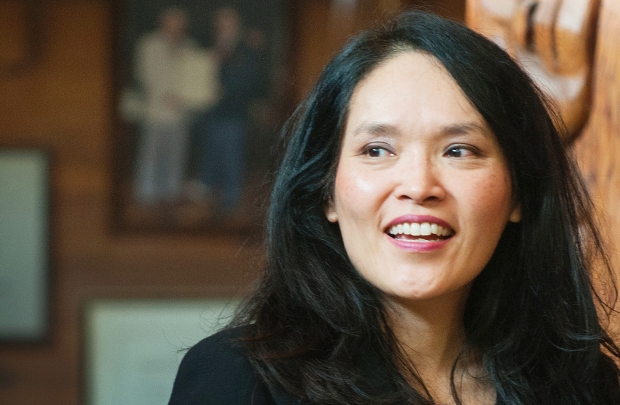BY DOUGLAS TODD, VANCOUVER SUN
VANCOUVER — Federal election candidates are promising to strictly enforce foreign-asset disclosure laws so every Canadian pays their share of taxes.
New Democratic Party candidate Jenny Kwan said this week that, even though many ethnic Chinese people are wary about disclosing their wealth to government officials, she strongly objects to tax evasion.
The Vancouver Kingsway hopeful is one of several candidates who have expressed views related to articles in The Vancouver Sun and elsewhere revealing thousands of mansion owners in Metro Vancouver, many of them Chinese, are not paying Canadian income taxes because they appear “extremely poor,” mainly because they’re failing to report offshore assets.
When the NDP held power in B.C. in the late 1990s, premier Glen Clark and finance minister Andrew Petter joined Chinese business leaders in opposing aspects of proposed federal Liberal legislation aimed at clamping down on immigrants who hid their foreign assets from Revenue Canada.
At the time Kwan, a member of the province’s NDP government, was reported as saying, “The Chinese are very private about their money. This law goes against our culture.” Her comments appeared in the book Millionaire Migrants, by UBC geographer David Ley, and were cited in a Saturday article in The Sun.
Kwan said this week her early quote was an accurate “observation” in light of fear expressed by Chinese realtors and others in the 1990s that the economy was suffering because immigrants were leaving Metro Vancouver to return to Hong Kong, possibly because of the proposed foreign-asset disclosure law.
Asked if she agreed with her NDP government’s 1990s opposition to the foreign-asset disclosure laws, Kwan said this week, “I was never asked that question. And my position then and now remains that Canadians, regardless of their origins, should be treated the same under all laws.”
As an NDP MLA, Kwan held a June forum on Metro Vancouver’s housing affordability crisis. This May in the B.C. legislature she called on Finance Minister Mike de Jong to collect more reliable data on the extent of foreign ownership of Metro Vancouver housing, which planners say contributes to the region’s astronomical prices.
Kwan’s Liberal rival in the Vancouver East riding, Edward Wong, said this week that “All Canadians must bide by the rule of law” regarding foreign-asset disclosure rules.
“As a trial lawyer, I believe when you come to Canada you must pay your fair share of taxes.”
Wong was not convinced that widespread failure to disclose foreign assets should be linked with ethnic Chinese residents in Metro Vancouver, many of whom arrived through the federal immigrant-investor program.
However, asked about demographic studies of Metro Vancouver by UBC geographer Dan Hiebert and others that show a strong correlation between expensive mansions, reports of “extreme poverty” and predominantly Chinese neighbourhoods, Wong wouldn’t comment further, saying “I haven’t undertaken those kinds of studies.”
Conservative Party candidates in B.C. have also recently promised to show no tolerance to Canadians who illegally evade taxes by not disclosing their offshore assets to tax officials.
“Our government has zero tolerance for tax evasion,” said a spokesman for B.C. Conservative MP (Delta-Richmond East) Kerry-Lynne Findlay, who is Canada’s minister of national revenue. Carter Mann said the federal government in 2014 brought in tough legislation to root out those not declaring offshore assets.
However, Murray Rankin, the NDP candidate for Victoria, said the Conservative government has not been aggressive enough in going after those who flout tax laws — in part because of “endless cuts” of Revenue Canada tax auditors who had the knowledge to track “complex international tax avoidance schemes.”
Green party leader Elizabeth May, the candidate for Saanich-Gulf Islands, also said in September that Revenue Canada should be mandated to use more forensic accounting to go after offshore accounts and dubious tax-haven loopholes.
For her part, Kwan agrees with an anti-tax cheat strategy proposed by that Vancouver immigration lawyer Richard Kurland proposed at her June forum on housing affordability.
Kurland told her one of the best ways for Revenue Canada to stop people with Canadian passports hiding their offshore assets is by more rigorously requiring that house buyers declare their permanent place of residence. That could help stop people from declaring they’re “non-residents” to avoid paying income taxes, while they declare themselves Canadian residents for property purchases.
Vancouver South Conservative MP Wai Young did not return the Sun’s phone calls or messages this week. Vancouver Kingsway Liberal candidate Steven Kou, an accountant who is vice-president of the Canada Chinese Investors and Entrepreneurs Association, also did not return calls. Neither did Alice Wong, the incumbent Conservative candidate for Richmond Centre, nor Kenny Chiu, the Conservative candidate for Steveston-Richmond East.




